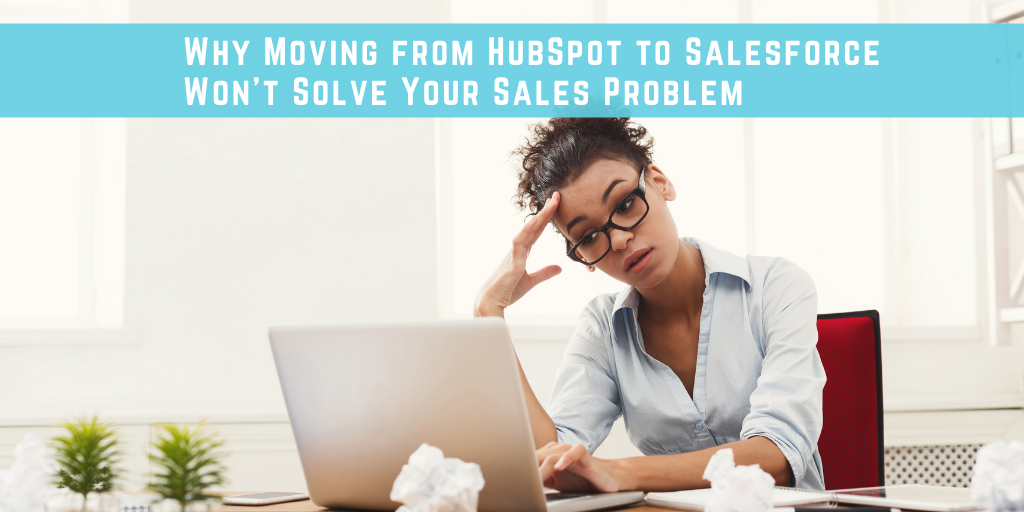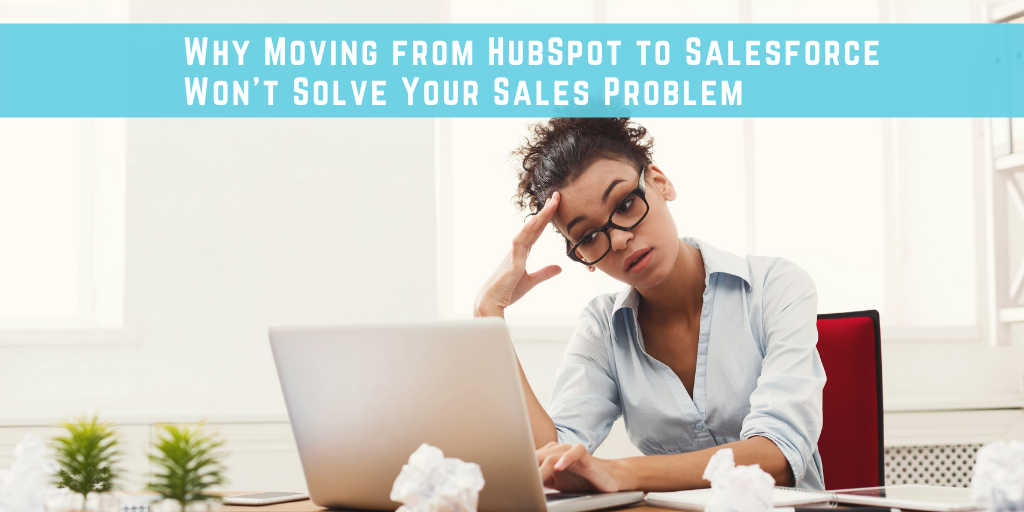3 min read
Why Moving from HubSpot to Salesforce Won't Solve Your Sales Problem
![]() Orange Marketing
:
December 20, 2021
Orange Marketing
:
December 20, 2021


Don't make the mistake of thinking that pivoting to Salesforce will fix your sales problems—that's not your problem. Not hitting your targets? Don't blame the system.
Instead, ask these questions:
- Are your people calling their leads?
- Do they have the right messaging?
- Are they following up on their deals?
Unfortunately, changing to Salesforce won't increase or decrease visibility to sales activities. It won’t change anything because your underlying problem isn’t your sales CRM—it’s probably your marketing and sales processes and how they work together.
What our clients have taught us.
How do we know moving to Salesforce won't help?
We'll give you two (out of many) client examples. Both were startup SaaS clients who were disappointed with their sales results. They claimed moving from HubSpot to Salesforce would improve outcomes. Tellingly, this was after both clients had sales leadership changes — and the new leadership had always used Salesforce.
We get it. A lot of people like to continue using what they know. And Salesforce is the Blackberry of CRM as Salesforce was the first to introduce a SaaS CRM solution. In fact, Salesforce practically invented the term SaaS. It's been a safe choice for people for a long time and is simply what people are comfortable with.
Salesforce & HubSpot: Similarities and Differences
Despite being well-loved and often used by the Fortune 1000, Salesforce is also a 20-plus-year-old piece of software (founded in 1999) and written in an old-school way that usually requires a sales admin to run it. On the other hand, HubSpot has been around 15 years (2006) and was set up from the get-go to be a Salesforce killer by being more user-friendly and self-service, allowing people to do things themselves. Ultimately HubSpot is easier to learn and customize.
HubSpot has performed well against Salesforce because they have ensured almost everything you can do in Salesforce you can do in HubSpot. (Of course, there are exceptions for large enterprises that run their operations and custom software integrated with Salesforce.)
Because Salesforce was an open platform, people built apps and pieces of software around it. HubSpot took some of these pieces of software and made them native in HubSpot, making the process more seamless (e.g., outreach.io's ability to help users run templates and sequences.)
HubSpot and Salesforce do exactly the same things, and have competitive functionality—there's no real difference; one is no better than the other. However, when put head-to-head, we choose HubSpot every day.
Why? Because we find that HubSpot is much easier to use unlike the "Ph.D. in Salesforce" you need to operate the SaaS giant, if you're starting from scratch (like many of our SaaS startup clients) and you're implementing sales and marketing at the same time, you can do it all in HubSpot—and those processes work nicely together in one platform.
Why switch when you don't have to?
Okay, so our preference aside, if both Salesforce and HubSpot basically do the same thing, why do people think switching from one to another will make a difference when it comes to solving sales problems? Because, often, people mistake the software as the problem when it's really a people and/or process problem.
One example.
The Spreadsheet Lover
One of our clients firmly believed that HubSpot was to blame for their sales forecasting not working. However, the actual culprit was their finance team who were using spreadsheets to forecast. Why? Because they were familiar with and comfortable using spreadsheets.
Instead of actually trying to build a report in HubSpot that could do all of this for them, they were recreating it in a spreadsheet. It turns out, they weren't getting what they wanted out of the spreadsheet because they never really defined their requirements.
Instead of taking the time to learn how to do this in HubSpot, the client used an outdated tool that wasn't providing any assistance to their finance team. Then, they turned around and blamed the software 🤦.
In this case, changing the system will not change the outcome; if the data is dirty, it doesn't matter if you're using Salesforce or HubSpot—you will have poor results.
Know What the Real Problem Is
Ultimately, there are three things involved in a successful business–big or small, established or startup: people, process, and technology.
Both Salesforce and HubSpot systems work in almost exactly the same way. However, if you have people executing processes willy nilly, your sales results will be junk.
The technology is not in the driver's seat—your processes, which your people manage, are!
Don't cost your company money by switching to another software platform, moving your data, retraining your sales team, and changing your processes. It'll be expensive, you won't get any functionality you don't already have, and you'll end up recreating the same problem in another system.
Instead, look at how your people are executing your processes today: Are they using outdated tools, or are they taking full advantage of all the functionality your current software suite offers?
Want more sales tips?
We wrote the book! Whether you're just starting out or need a sales team refresher - this ebook is a must-read for high-performing results! Full of real-life client examples, take our experience and run with it!
Additional Ebook Resources:
The Truth About B2B Marketing
The Truth About B2B Email Deliverability
Breaking the Mold in Sales & Marketing
